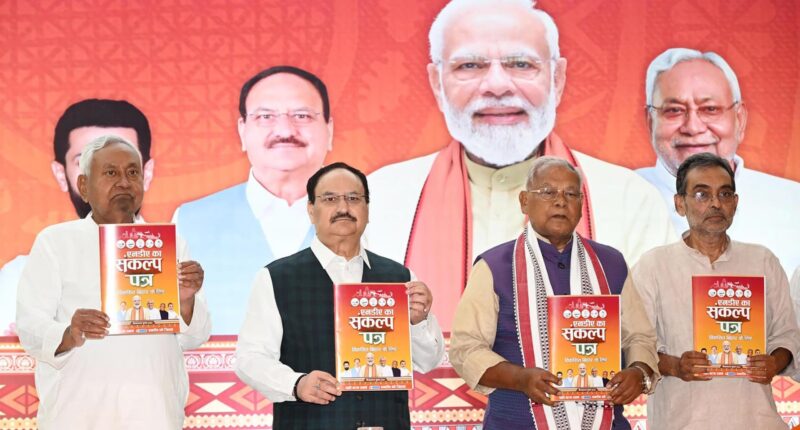Share this @internewscast.com
PATNA, INDIA – OCTOBER 31: Ahead of the 2025 Bihar Assembly Elections, Bihar Chief Minister Nitish Kumar joined forces with BJP national president J.P. Nadda, along with HAM party founder Jitanram Manjhi, RLM president Upendra Kushwaha, and other leaders, to unveil the NDA manifesto, known as the Sankalp Patra.
Image Source: Hindustan Times | Hindustan Times | Getty Images
The recent electoral triumph for Prime Minister Narendra Modi’s party in a pivotal state is anticipated to open avenues for New Delhi to make concessions on agriculture, addressing a key demand from U.S. trade negotiators.
The National Democratic Alliance (NDA), spearheaded by the Bharatiya Janata Party (BJP), is on the verge of a sweeping victory in Bihar. Trends indicate that the NDA is leading in almost 200 out of 243 seats, while the opposition lags with leads in fewer than 30 seats, according to data from India’s election commission.
A decisive win in Bihar—India’s third most populous state and a significant corn producer—is likely to bolster the government’s confidence in finalizing a trade agreement with the U.S. This agreement would potentially involve increased imports of American agricultural products, as noted by Amitendu Palit, a senior research fellow at the Institute of South Asian Studies.
Nevertheless, Palit emphasized that these agricultural imports from the U.S. will be framed in a way that does not indicate a retreat from the government’s commitment to support domestic farmers.
Indian exports to the U.S. currently face some of the highest tariffs, of 50%, but the two sides have been engaged in negotiations for a “fair trade deal.”
In September, U.S. President Donald Trump doubled down on his criticism of India, calling trade ties with the country “a totally one-sided disaster!” Commerce Secretary Howard Lutnick later asserted this position in an interview with Axios stating “India brags about having 1.4 billion people but won’t buy even a small amount of American corn.”
During Indian Commerce Minister Piyush Goyal’s visit to Washington in late September, Indian officials reportedly acknowledged that “fresh offers have been made,” including discussions to buy corn for ethanol production.
While several rounds of trade negotiations have occurred between the two countries, and U.S. has since softened its stance with Trump even hinting that Washington will reduce tariffs on India, a trade deal has been elusive.

The Indian government is waiting for the Bihar elections to end to finalise a trade deal with the U.S., said Praveen Jagwani, CEO of UTI International, adding that New Delhi has made some concessions around farm related issues.
Despite trade negotiation pressures, substantial barriers to U.S. corn imports persist, S&P Global said in a note on Oct 2.
India has banned genetically modified crop imports and 94% of U.S. corn consists of GMO varieties, S&P noted adding that India’s tariff structure “imposes a 15% duty on corn imports up to 500,000 mt, with rates jumping to 50% beyond that threshold.”
Easing of these terms could raise “dumping concerns that could impact domestic farmers” S&P said. Proposals to import maize from the U.S. is already causing discomfort among farmers, according to local media reports in October.
The NDA win in Bihar will give the government some political room to push for regulated maize imports which can be used as poultry feed under the U.S.-India trade talks, M.J. Khan president of Indian council for food and agriculture told CNBC in a written statement.
He added however that the government may not approve genetically modified maize, as farmer sensitivities are “still too strong.”
More major state elections are due next year, such as in West Bengal, Tamil Nadu, and Kerala — all states, where farming lobbies are significant — followed by Uttar Pradesh in 2027.
“Projecting a pro-farmer image, while balancing trade interests and strategic ties with the US, will be the priority for the BJP government,” said Palit of Institute of South Asian Studies.







